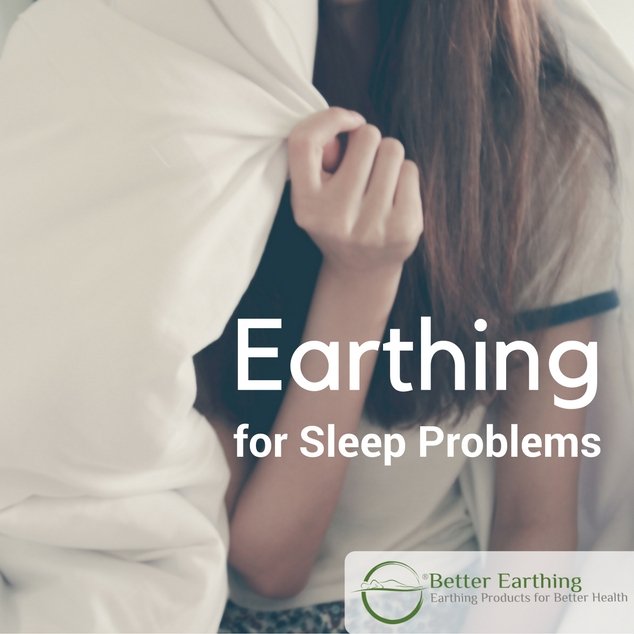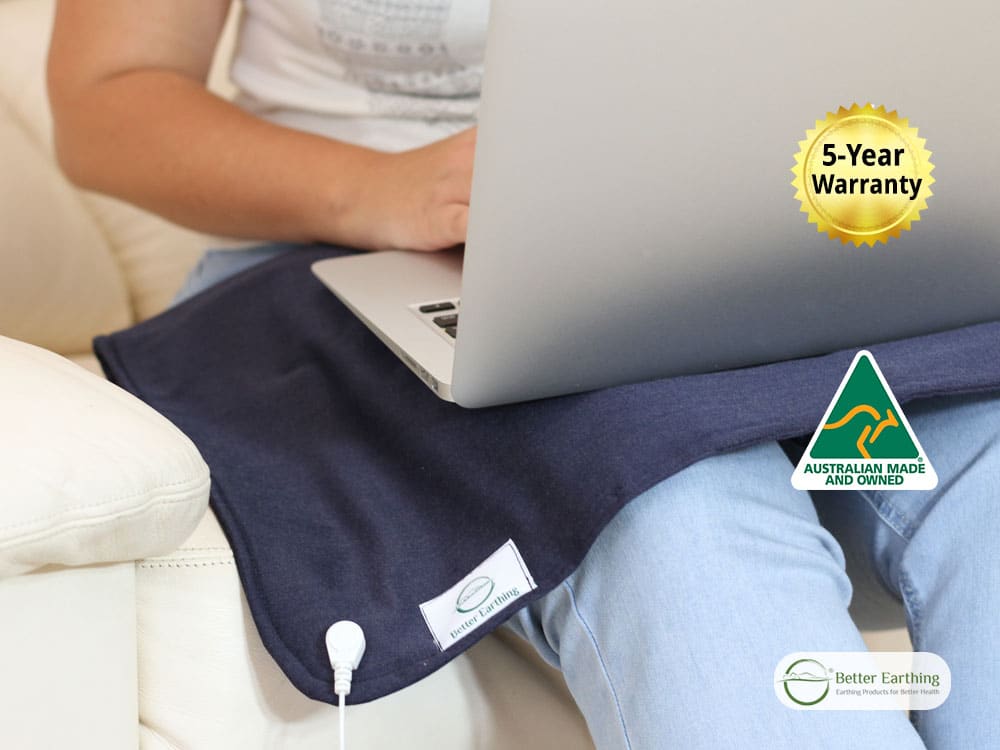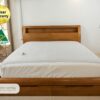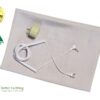Sleep Problems

Sleep problems is a term used to describe a range of different conditions associated with disturbed sleep. These include insomnia; that is, the inability to fall asleep or stay asleep, sleep apnea which is a condition in which breathing stops temporarily during sleep, jet lag, or other sleep issues such as sleepwalking, nightmares, or even night terrors.
Some of these conditions have a very obvious cause and are easily treated by lifestyle changes or medication. Others are less obvious and sometimes it is necessary to think outside the box to find a solution for healthy sleep.
Earthing is a completely natural lifestyle change that can help with a wide range of sleep disorders. In recent years, new research has been done that shows grounding therapy benefits health and well-being in general and positively influences sleep quality and daytime energy levels.
Why is Sleep so Important for Health?
The circadian rhythm, or circadian cycle, is a natural internal process that regulates the sleep-wake cycle. During this cycle, your body produces several vital hormones. Perhaps the most important of these is melatonin. Melatonin is secreted by the pineal gland. As well as promoting sleep, melatonin has the functions of increasing daytime energy, slowing cell damage and aging, and may even inhibit the growth of certain cancers (Jadim-Perassi BV et al. Cited by Oschman, 2000)(1).
Other hormones affected by sleep include leptin and ghrelin. These are associated with appetite control and failing to get sufficient sleep can result in overeating the following day. Short-term, this is not a big problem. However, poor sleep over longer periods can lead to weight gain and all the associated risks such as diabetes and cardiovascular disease.
Lack of sleep is also associated with raised levels of another hormone – cortisol. Cortisol is produced by the adrenal glands and is one of the hormones involved in the “fight or flight” response to stress. Cortisol is needed to feel awake in the mornings and be active throughout the day. Cortisol naturally decreases throughout the afternoon. In the evening it should it its low. Having raised cortisol at night makes it difficult to achieve deeper sleep and can lead to increased stress and anxiety, inflammation, unstable blood sugar, reduced immunity, and bone density. In addition, higher cortisol levels narrow the arteries and restrict blood flow which creates a higher risk of hypertension and cardiovascular disease.
Causes of Sleep Problems
Some sleep problems are temporary and have a very obvious cause. Most people have experienced a few sleepless nights during a period of change or worry. This normally resolves by itself after a few nights, but for some people, it can be ongoing. This can lead to a vicious cycle of anxiety and frustration, which makes getting better sleep even more difficult.
Difficulty in falling or staying asleep may also have a physical cause. Pain, chronic inflammation, and chronic disease can make it difficult to get comfortable at night leading to broken sleep. Other situations that make it hard to find a comfortable sleeping position include pregnancy, hormonal hot flushes, muscle soreness, restless leg syndrome, or even something as simple as an uncomfortable bed or pillow.
Sleep apnea happens when the airways relax and close during sleep. This causes the breathing to stop for a few seconds and suddenly restart. People with this condition may not be aware that they have it. A common symptom is waking up feeling fatigued after a full night’s rest.
Other sleep disorders such as nightmares and sleepwalking may have a psychological cause. This can be identified and treated with talking therapies such as counseling.
Other reasons for sleep disturbance include shift work and jet lag, which is caused by traveling between time zones. Earthing has been shown to “reset” your body clock over six weeks, which can help with establishing good sleep habits and resolving circadian rhythm sleep disorders.
Types of Sleep Medication
There are various types of medication available for treating disturbed sleep and insomnia. Over-the-counter medications include antihistamines (these have the side effect of causing drowsiness) and herbal preparations. Herbal sleep medications usually include ingredients such as valerian, hops, passionflower, and kava.
Stronger medications are available on prescription and include benzodiazepines like temazepam, benzodiazepine receptor agonists such as zopiclone and zolpidem, antidepressants, antipsychotics, and melatonin supplements.
These medications can be effective when used properly for a short duration of time. However, they do have side effects, including the risk of dependence. In the long term, natural, drug-free solutions are far more suitable.
Risks and Side Effects of Sleeping Medicine
By far the biggest risk with most sleeping pills is the risk of dependence. When you take sleeping pills regularly, your body quickly adapts and they become less effective. This means that it is tempting to take higher and higher doses to get the same effect. After a while, you can develop what is known as rebound insomnia. This is when you come to rely on sleeping pills to fall asleep and are unable to do so without them.
Benzodiazepines have the effect of relaxing the muscles and suppressing breathing. This means that they can worsen conditions where breathing stops and starts or is obstructed.
Other side effects of sleeping pills can include daytime drowsiness, dry mouth, headaches, nausea, and dizziness (more information about sleeping pills and their side effects here).
How to Sleep Better Naturally
There are many simple steps you can take to improve your sleep naturally and avoid the need for medication. These include:
Establishing a good bedtime routine. Getting up and going to bed at the same time each day allows your body to get into a routine and makes falling asleep easier.
Avoid eating and drinking in the evening. Eating late in the evening means that your body is still working hard to digest your meal when you are sleepy. Your body will be more active (internally) and use more energy exactly when you don’t want it to. Feeling full can make it difficult to get comfortable and drift off. Drinking caffeinated drinks in the evening (coffee, tea, and cola) can also create sleep difficulties. Avoid caffeine and go for herbal teas such as chamomile or peppermint instead.
Don’t overstimulate yourself before bed and avoid activities that make your mind overactive in the evening. Looking at television, computer, or mobile phone screens is particularly detrimental as the light given off by these blocks melatonin production and makes falling asleep more difficult.
Be active during the day. Do some physical activity or light exercise. This will help you feel more tired in the evenings. Going outside is also important as natural daylight helps to reset your body clock making you feel more awake in the day and tired in the evening.
Make your bedroom a haven for sleep. Invest in a comfortable mattress, pillows, and bedding, and make sure that you have the room heated or cooled to a comfortable temperature. Avoid activities apart from sleeping in the bedroom. That way, your body will begin to associate getting into bed with falling asleep. Your body does not need electronic devices such as TV or computers to get improved sleep.
You can also try keeping a sleep diary to help identify habits or patterns that contribute to restful sleep.
Improving your sleeping environment and setting up healthy habits are part of good sleep hygiene.
Try earthing for sleep using a grounding mat or underlay. Research has shown that earthing helps to regulate biological rhythms and improve sleep, making falling asleep easier and reducing waking during the night.
Earthing for Deep Sleep
Earthing uses the earth’s natural energy to improve health and well-being.
The earth carries a slight negative electrical charge. This is due to free electrons on its surface. When you come into conductive contact with the earth, either by standing on it barefoot or using an earthing system, this charge is transferred to your body.
In your body, these free electrons work as antioxidants. They neutralize harmful free radicals and reset your biological rhythms. This includes your sleep-wake cycle.
Earthing allows you to naturally fall asleep faster, sleep more deeply, and wake fewer times during the night. It does this by increasing your levels of melatonin while reducing your levels of cortisol. Since earthing promotes the natural regulation of these two hormones, there is no risk of overdose or side effects as there is with sleeping pills.
You can read more about how earthing works and its effects on the body.
Research on Earthing for Better Sleep
The research on earthing and sleep quality is very positive. This 2004 study published in the Journal of Alternative and Complementary Medicine confirmed that earthing normalises cortisol levels throughout the day (2). The majority of the subjects reported an improvement in sleep quality, stress, and pain symptoms by the end of the six-week study.
9 out of 12 participants reported reduced fatigue and stress with improved daytime energy levels. As well as being able to fall asleep faster, they woke less frequently during the night, reducing from an average of 2.5 times to 1.4 times a night. They also fell back to sleep faster.
A further study showed that earthing also increased melatonin levels. These results are cited in the book chapter Biophysics of Earthing by James Oschman et al (1). It states:
“Melatonin increased in 66% of subjects after sleeping grounded for 6 weeks. Increases ranged between 2% and 16%. Melatonin decreased by 6% in only one of the subjects. The other three remained the same.”
How Long Before My Sleep Improves?
The amount of time it takes varies from person to person. Some people experience relief within the first few days of sleeping on an earthing product. For others, it can take a few weeks to experience the full benefits. Here is what people are saying about using earthing to improve their sleep:
“After the second night, I noticed a difference. I was sleeping for longer periods at a time, and when I woke up during the night (I have young children) I was falling asleep again almost straight away. It’s amazing, I no longer have a sleep problem and love going to be each night as I feel so comfortable and no longer have the stress that I will have another sleepless night.”
– Cathy Corbett, NT
“Having used the earthing sheet for just over two weeks now, I notice a marked improvement in sleep and feel more rested and vital as a result. Less aches and pains too, which is great. And I just feel more grounded, or earthed, if you prefer! My partner is also enjoying the benefits”
– Paul Treacy, VIC
“Given the ease at which I fell asleep with the earthing bed sheet I decided to try to give up the sleeping pills cold turkey. That was about a month ago and I have not taken a single pill since. I was totally shocked that it was able to do so with such ease. I still wake at night but fall back asleep easily.”
– Trevor R, VIC
How to Earth Overnight
Earthing overnight can be done using specially designed earthing bedding such as an earthing underlay sheet or pillowcase made of conductive materials such as stainless steel or silver. This is then grounded to earth in one of two ways.
The first method is to run a wire outside which is then connected to an earthing rod, and inserted into the ground, preferably close to a healthy tree or plant.
The second and most practical method is to use an indoor earthing system. This involves connecting your product (such as a grounding mat) to a special lead and adapter that plugs into the third ‘earth’ port of your power point, which in turn connects to a metal plate in the dirt outside the home. The power point can be off as no electricity is used, only earth. Better Earthing leads are fitted with a safety resistor for your peace of mind.
Earthing Research
1.Oschman J, Chevalier G, Ober, A.C. ‘Biophysics of Earthing (Grounding) the Human Body’ in Rosch P ed. Bioelectromagnetic and Subtle Energy Medicine. Routledge 2010.
Ghaly M, Teplitz D. ‘The biologic effects of grounding the human body during sleep as measured by cortisol levels and subjective reporting of sleep, pain, and stress’ Journal of Alternative and Complementary Medicine 2004;10 (5): 767–776





